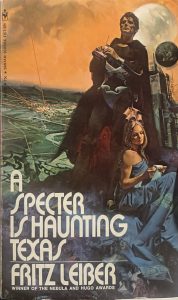In the bookshop, this book was barely discernible from the hoards of sci-fi pulp common in the 60’s, the mention of the author earning a Hugo and a Nebula piqued my interest however. Fritz Leiber rang a bell in the back of my mind, and with the ridiculous sounding summary, evoking “Giant hormone-fed Texans”, which was hopefully indicating a satire. In addition this was a great copy from 1971, this book, on its 50th anniversary deserved a read.
Scully, or Christopher Crockett La Cruz. Hailing Circumluna, a space station populated by refugees that left earth when World War III broke out. Living in space has left Scully in an 8 foot tall exoskeleton. Even though of considerable size himself, he finds himself dwarfed by the supremacist hormone-fed Texan civilization that apparently emerged out of a nuclear WW3, even though they had been in secret control of the US since joining in 1845 (which assured survival in WW3). Unable to fulfill his initial mission of securing his family’s mining rights, Scully finds himself at the center of the revolution breaking out in the “Mexes”. Even though uninterested, he engages in the revolution for its value for him as an actor. This all occurs while he balances a romantic triangle, trying to find the woman he will return to Circumluna with.
Fritz Leiber’s novel is an example of satirical pulp science fiction. The book, as the cover suggests, falls into the romantic category pretty quickly as well with a love triangle being quickly established. The world-building is very interesting, but it remains soft science fiction, with technology just serving as a way for Leiber to establish the dystopian situation. At times, the political satire can feel dated, as it is strongly anchored historically, with direct mentions to figures like LBJ.
I will try to not spoil too much or those who are interested in reading the book. What I will say is that with how crass the terms, situations, and portrayals of Leiber can be in this book. Arguably racist at points, Leiber is definitely falling into some casual sexism, with no female characters passing the Bechdel Test. Leiber’s potential critique of anglo-supremacy, through the absurdity of the Texans, is at many points lost due to the unpalatable descriptions and stereotypes presented. Especially when Scully’ reason to oppose this whole slave-based system, its not an ideological opposition, he wants to act.
Under this context, one redeeming quality of this satire, could be to read beyond its critique of texans, and the American supremacy they represented. In this case, Leiber’s crass satire that is generally “too much”, as well as the lack of a real conclusion in the end of the novel, could point towards a more wide ranging meta critique of the genre. This meta critique might read too much into the purpose of this story however. More probably than not, it is a half baked satire, using the comedic license of the satirical genre to present racially charged unpalatable jokes.
If cyborg romance, 60’s political satire, and crazy names like Elmo Oil-Field, are in your essential list for any novel I would recommend reading this, if not looking for a life changing message. If you intend, to open an intricate social critique of 60’s American society, you wont find it here. As it stands within its genre, it is better written than other contemporary works, the Hugo seems justified. In the end one wonders whether Leiber took the comedic license a bit too far.

Work Cited:
Leiber, Fritz. A Specter Is Haunting Texas. New York: Bantam Books (reprint: Galaxy Science fiction, 1968), 1971.

 What our science fiction says about us Different visions of the future are appearing around the globe. Tom Cassauwers explores what they reveal about each region – and how imagining alternative realities can be subversive.
What our science fiction says about us Different visions of the future are appearing around the globe. Tom Cassauwers explores what they reveal about each region – and how imagining alternative realities can be subversive.